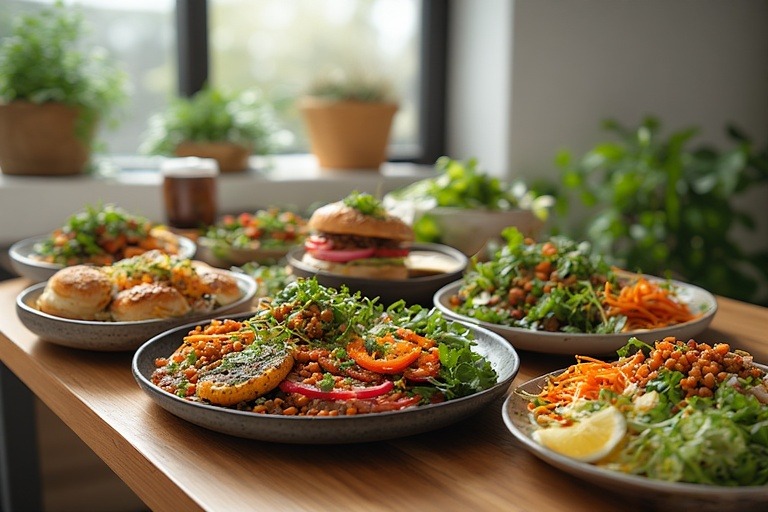The global food industry is undergoing a massive transformation, and at the center of this revolution are plant-based and alternative protein foods. From vegan burgers to lab-grown meat, these innovations are changing the way we eat, shop, and think about nutrition. But are they just a passing trend, or are they truly the future of food? Let’s explore this shift, compare options, and see how it fits into the lifestyle and health trends of 2025.
🥦 Why Plant-Based Proteins Are Rising
The demand for healthier, sustainable, and ethical eating has skyrocketed. Consumers are no longer satisfied with traditional protein sources like red meat and poultry. Instead, they want:
-
Health Benefits: Lower cholesterol, reduced risk of heart disease, and better digestion.
-
Environmental Impact: Producing plant-based protein uses fewer natural resources and reduces greenhouse gases.
-
Ethical Choices: More people are choosing diets that avoid harming animals.
This has led to the explosive growth of plant-based alternatives in supermarkets, restaurants, and even luxury dining.
🍔 The Evolution of Meat Alternatives
The most exciting development in recent years is how meat substitutes have evolved. Gone are the days when veggie burgers tasted bland and cardboard-like. Brands like Beyond Meat, Impossible Foods, and Quorn have elevated the game by introducing products that look, taste, and even “bleed” like real meat.
-
Texture & Flavor: Newer formulas use pea protein, soy, and even mushrooms to mimic the juiciness of beef or chicken.
-
Nutritional Profile: Many contain as much protein as traditional meat, without the saturated fats.
-
Versatility: From nuggets to sausages and deli slices, options are expanding every year.
🧬 Lab-Grown Meat vs. Plant-Based Meat
One of the most interesting comparisons today is between lab-grown (cultivated) meat and plant-based substitutes.
-
Lab-Grown Meat: Made from real animal cells, grown in controlled environments without the need to raise or slaughter animals. It provides the authentic taste of meat but with reduced environmental impact.
-
Plant-Based Meat: Fully vegan, made from peas, soy, lentils, or chickpeas, offering a healthier alternative that appeals to those avoiding animal products entirely.
👉 The verdict? Lab-grown meat is ideal for those who crave authentic taste, while plant-based is better for vegans and sustainability-driven eaters.
🥛 Beyond Meat: The Rise of Dairy Alternatives
It’s not just meat. Dairy products are also being reimagined with alternative proteins. Oat milk, almond milk, soy milk, and even potato milk have become household staples. Similarly, plant-based cheeses and yogurts are getting creamier, tastier, and closer to their dairy counterparts.
-
Oat Milk: Creamy, perfect for coffee, and sustainable.
-
Soy & Almond Milk: High protein but lighter in texture.
-
Plant-Based Cheese: From mozzarella to cheddar, brands are cracking the code for melt and flavor.
📈 Trending Plant-Based Protein Sources in 2025
This year, some new ingredients are taking center stage:
-
Fava Beans: Becoming a popular source for high-protein meat substitutes.
-
Microalgae & Spirulina: Rich in nutrients, sustainable, and future-forward.
-
Jackfruit: A natural meat substitute with a pulled-pork-like texture.
-
Chickpea Protein: Used in snacks, desserts, and meat alternatives.
These ingredients are not only nutritious but also environmentally friendly, making them ideal for the modern conscious consumer.
💪 Health & Lifestyle Benefits
Switching to plant-based or alternative protein foods doesn’t mean compromising on nutrition. Instead, it enhances lifestyle in several ways:
-
Weight Management: Fewer calories and healthier fats.
-
Better Digestion: More fiber from plants.
-
Athletic Performance: Many athletes now prefer plant-based protein powders for recovery and endurance.
-
Longevity: Studies show that plant-heavy diets support longer, healthier lives.
🔮 The Future of Protein
Looking ahead, the plant-based and alternative protein market is expected to grow even further. With big companies and startups innovating every year, we can expect:
-
More realistic textures and flavors in meat substitutes.
-
Affordable lab-grown meat, making it accessible to the average shopper.
-
Hybrid foods, combining plant-based protein with cultivated meat for balance.
-
Expansion into global cuisines, offering plant-based sushi, kebabs, and dumplings.
🌍 Final Thoughts
Plant-based and alternative protein foods are not just a dietary trend—they are a cultural shift. In 2025, eating consciously means more than choosing organic vegetables; it means considering sustainability, ethics, and personal health. Whether you are a flexitarian, vegan, or simply curious, there has never been a better time to explore the diverse world of plant-based and alternative proteins.
The future of food is here—and it’s delicious, nutritious, and sustainable.















